Unit 2 Working the land Learning about language 课件(幻灯片39张)
文档属性
| 名称 | Unit 2 Working the land Learning about language 课件(幻灯片39张) |  | |
| 格式 | zip | ||
| 文件大小 | 2.3MB | ||
| 资源类型 | 教案 | ||
| 版本资源 | 人教版(新课程标准) | ||
| 科目 | 英语 | ||
| 更新时间 | 2019-11-08 09:17:49 | ||
图片预览


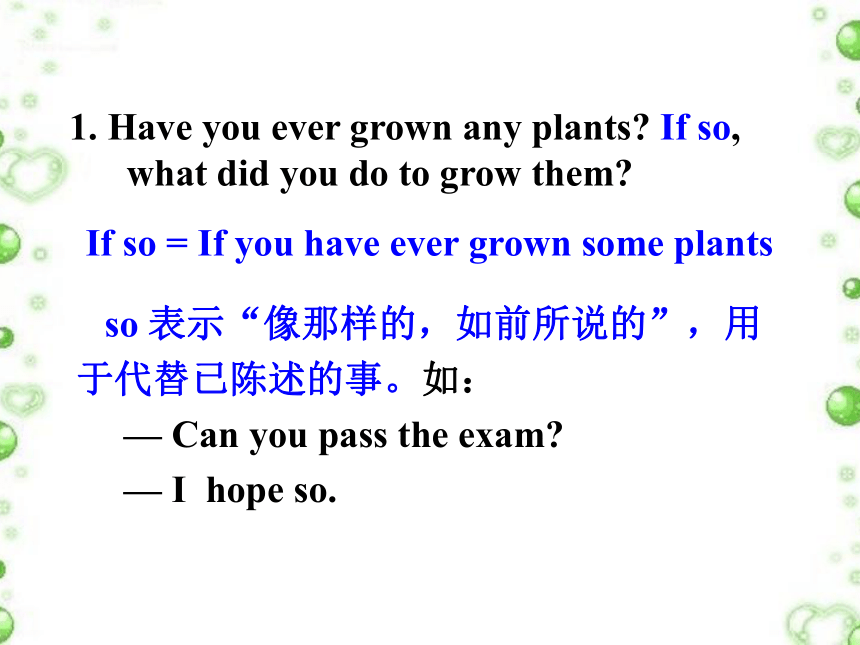
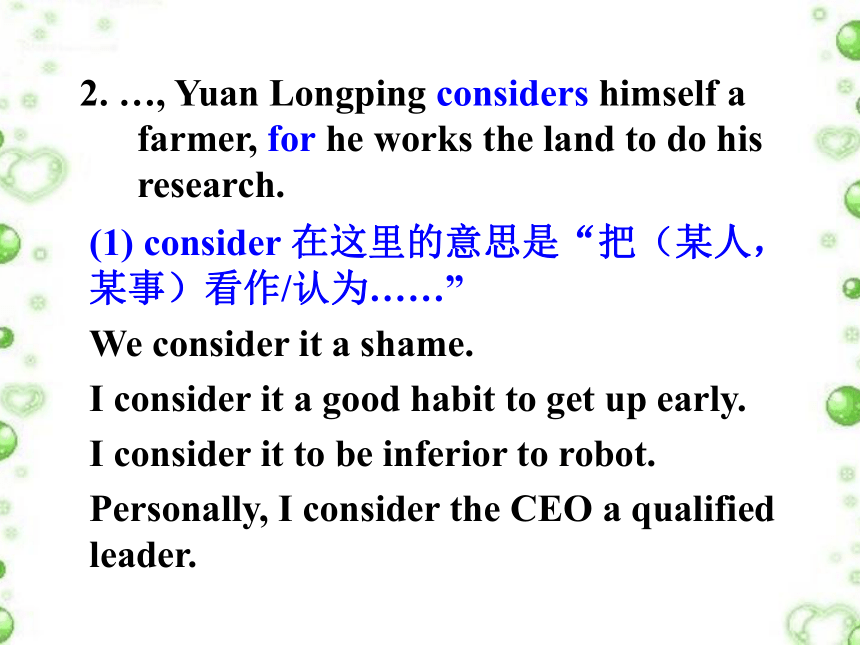

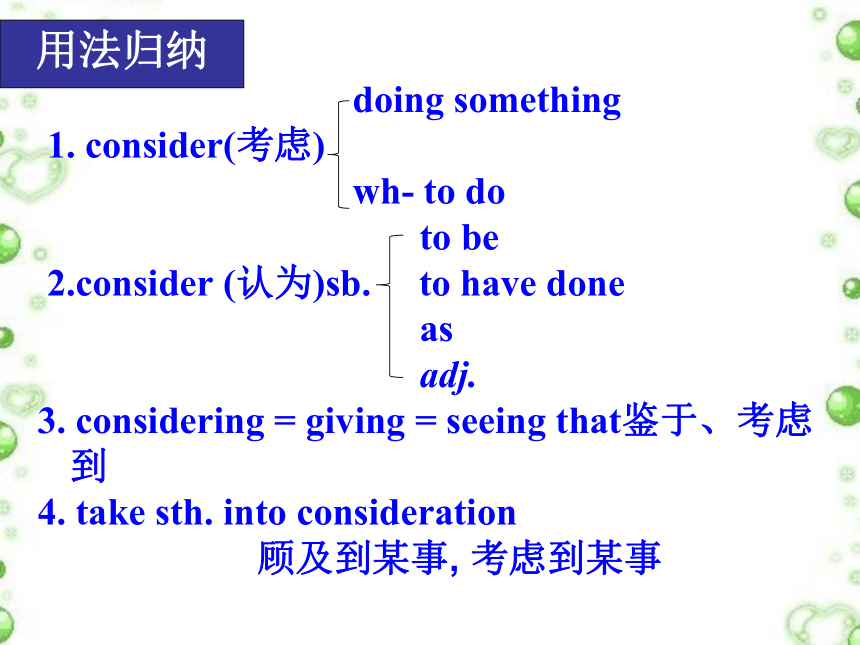
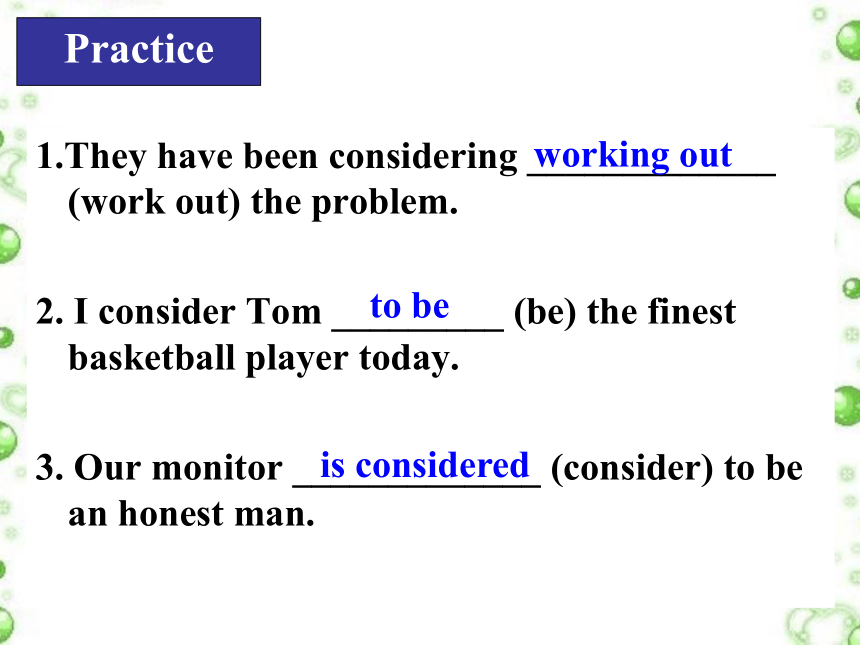



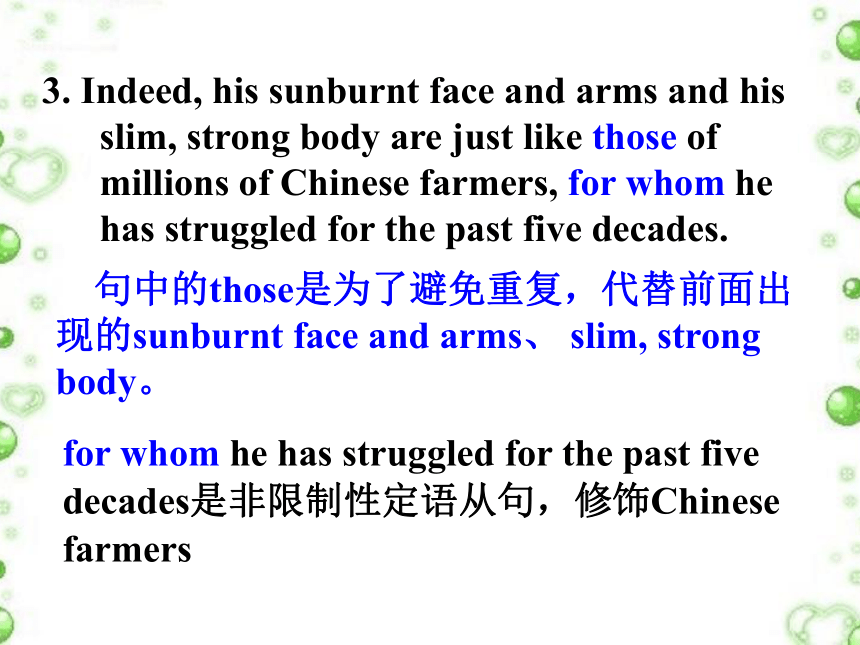
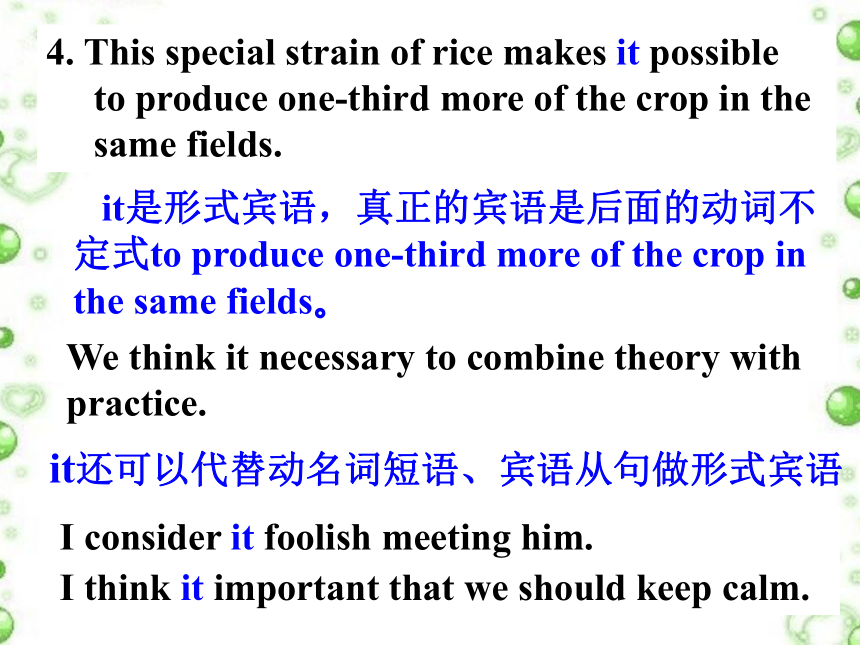
文档简介
(共39张PPT)
Translate the phrases into Chinese.
graduate from
increase the output
search for
circulate knowledge
thanks to
rid … of …
twice as … as …
be satisfied with
care about
would rather
awake from
毕业于……
提高产量
搜寻,寻找
传播知识
由于,归功于
摆脱;除去
是……的两倍
对……感到满意
在乎,在意;喜欢
宁可,宁愿
醒来;察觉
1. Have you ever grown any plants? If so, what did you do to grow them?
If so = If you have ever grown some plants
so 表示“像那样的,如前所说的”,用于代替已陈述的事。如:
— Can you pass the exam?
— I hope so.
2. …, Yuan Longping considers himself a farmer, for he works the land to do his research.
(1) consider 在这里的意思是“把(某人,某事)看作/认为……”
We consider it a shame.
I consider it a good habit to get up early.
I consider it to be inferior to robot.
Personally, I consider the CEO a qualified leader.
consider还有“考虑;思考;体谅;注视”等意思
Would you consider going north this summer?
Please take time to consider the problem.
They did not consider whether they could afford the time or not.
doing something
1. consider(考虑)
wh- to do
to be
2.consider (认为)sb. to have done
as
adj.
3. considering = giving = seeing that鉴于、考虑到
4. take sth. into consideration
顾及到某事, 考虑到某事
用法归纳
1.They have been considering _____________ (work out) the problem.
2. I consider Tom _________ (be) the finest basketball player today.
3. Our monitor _____________ (consider) to be an honest man.
Practice
working out
to be
is considered
所给用适当形式填空。
1. Have you ever considered ________ (give)
her a birthday present?
2. John did quite well in his exams, _______ (consider) how little he studied.
3. ___________ (consider) everything, we should give them another chance.
4. He made a ___________ (consider) sum of
money in real estate.
giving
considering
Considering
considerable
(2) for (因为,由于)补充说明理由。不用于句首;不能回答以why引起的问句。如:
The shop was quite new, for it had opened only the week before.
because表示理由充分,有必然因果关系, 能回答以why引起的问句。
— Why aren’t you coming with us to the concert?
— Because I have got a bad headache.
3. Indeed, his sunburnt face and arms and his slim, strong body are just like those of millions of Chinese farmers, for whom he has struggled for the past five decades.
句中的those是为了避免重复,代替前面出现的sunburnt face and arms、 slim, strong body。
for whom he has struggled for the past five decades是非限制性定语从句,修饰Chinese farmers
4. This special strain of rice makes it possible
to produce one-third more of the crop in the
same fields.
it是形式宾语,真正的宾语是后面的动词不定式to produce one-third more of the crop in the same fields。
We think it necessary to combine theory with practice.
it还可以代替动名词短语、宾语从句做形式宾语
I consider it foolish meeting him.
I think it important that we should keep calm.
We consider it our duty to support good leaders.
it做形式宾语,通常和下列动词连用:consider, think, make, find, believe, count, declare, deem, fancy, feel, guess, imagine, judge, prove, see, show, suppose, understand, take等
The new method makes it possible to complete the task faster.
Tom found it very embarrassing to be reminded of the long-standing debt.
Susan deemed it advisable to keep the matter secret.
We all feel it nice to be able to visit that distinguished university.
5. Now more than 60% of the rice produced
in China each year is from this hybrid strain.
句中的主语中心词rice是不可数名词,所以谓语动词用单数。
过去分词短语produced in China each year 作定语修饰rice,属动宾关系。
Two thirds of the earth’s surface is made up of water.
Two thirds of the workers are women.
I like reading the novels written by Mark Twain.
They searched everywhere but could not find the lost child.
The home was searched but no one was found.
6. Dr Yuan searched for a way to increase rice harvest without expanding the area of fields.
search = try to find by looking for 搜查
▲ search常用的搭配:
search sb. / sth. 搜查某人/某物
search for sb. / sth. 搜寻某人/某物
search sth. / sb. for… 搜查某物/某
人以寻找 ……
in search of 寻找
search out 发现
The policeman searched the thief to see what he had in his pockets.
The villagers are searching for the missing child.
search sb.指“搜查某人”,指对某人进行搜身。
search for sb.指“搜寻某人”,指为了要找到某人进行搜寻,相当于look for。
7. … without expanding the area of the fields.
expand vt. 使变大;伸展;详述;增长
Metals expand when they are heated.
He is thinking of expanding his business.
The eagle expanded its wings.
They have expanded my view on the question.
In ten years the city’s population expanded by 12%.
8. Thanks to his research, the UN has more tools in the battle to rid the world of hunger.
1) thanks to表示“幸亏,多亏”,多用于表达正面意思,相当于感谢,在句中作状语和表语。
Thanks to your help, much trouble was saved.
thanks?to, because, because?of, since, for
和as的用法
thanks?to?和because?of?都只能接名词或名词短语。thanks?to有“多亏了”的含义,而because?of则是“由于、因为”的意思。
because、?as、?since、?for 是连词,后面接从句,because语气最强,for的语气最弱。
1). Miss Gao didn’t come to the meeting
________ she was ill.
2). _____ you all know, China has hosted the
2008 Olympic Games.
3). _____ everybody makes a mistake, we
should give the boy a chance.
because
As
Since
Fill in the blanks with thanks?to, because (of), since, for or as.
4). It must have snowed last night, _____the
ground is covered with snow.
5). _________ your help, we could finish the
job on time.
6). _____ you are so busy, I’ll ask Lily to go
with me.
for
Thanks to
Since
2) rid … of … 使 … 摆脱;清除 …
I want to rid this city of pollution.
The man rid himself of debt.
get rid of 摆脱,除去
类似结构的动词:
inform / warn / cure … of …
The sales manager asked his men to inform him of everything concerning the sales in time.
9. Using his hybrid rice farmers are
producing harvests twice as large as before.
英语中的倍数表达法共有三种形式:
(1) 倍数 + 形容词/副词的比较级 + than...
(2) 倍数 + as +形容词/副词的原级 + as...
(3) 倍数 + the + 名词+ of...
This building is five times higher than that one.
This building is five times as high as that one.
This building is five times the height of that one.
The new building is four times the size of the old one.
10. And he would much rather keep time for
his hobbies.
would rather 宁愿,宁可
He’d rather work in the countryside.
用法1:
would rather…than… 宁愿……而不……,与其……不如……
I would rather watch TV at home than go to the cinema.
用法2:
would … rather than… = would rather … than …
Facing the enemies, our soldiers would die rather than surrender.
Rather than refuse to help you, I would borrow money from my friends.
用法3:
would rather后面也可跟从句表示主语宁愿某人做某事。这时,从句谓语应用虚拟语气,即用一般过去时表示现在或将来要做的事;用过去完成时表示已经做过的事或过去要做的事。
I’d rather you hadn’t told him the news that day.
用法4:
would rather have done sth.
表示主语要做某事, 而结果却事与愿违。
I’d rather have left a note on her desk.
我本想留张字条在她的书桌上。
(事实上没有)
11. However, he cares little about spending the money on himself or leading a comfortable life.
lead ... a life / live ... a life 过......的生活
Now we are leading a happy life.
In the old days farmers led a terrible life in the country.
与lead相关的短语:
lead sb. away 使某人误入歧途
lead sb. by the nose 牵着某人的鼻子走
lead up to sth. 是导致......的原因
lead from the front 带头;带动
12. Indeed, he believes that a person with too much money has more rather than fewer troubles.
1) too much
too?much可单独使用,也可修饰一个不可数名词,意思是“太多的,过分的”。
She does talk too much, doesn’t she?
He has too much work to do.
much?too通常用来修饰形容词或副词。
The dress is much too long for me.
I got into the taxi and drove much too fast.
2) rather than 而不是
She is a career woman rather than a housewife.
She ran rather than walked.
It is better to express your anger, rather than bottle it up.
注意:
rather than 连接两个名词或代词作主语时,
谓语动词应与rather than 前面的名词或代词
在人称和数上保持一致。
Mary, rather than her roommates, is going to Beijing.
13. He therefore gives millions of yuan to
equip others for their research in
agriculture.
equip vt. 装备,配备,供给,提供
He equipped himself for a long journey.
Proper education will equip one for a job.
equipment n. 设备, 装备, 器材
He came to Guangzhou and hoped for a job.
14. … with the hope of producing a kind of rice
that could feed more people.
with the hope of 怀有……的希望
in (the) hope of 希望做……
hope for sth. 希望得到……
He came to Guangzhou with the hope of finding a job.
He came to Guangzhou in the hope of finding a job.
他来到广州,希望找到一份工作。
1. Finish the exercises in Discovering
useful words and phrases in Learning
about language.
2. Finish the exercises in Using words and expressions in Workbook.
Homework
Translate the phrases into Chinese.
graduate from
increase the output
search for
circulate knowledge
thanks to
rid … of …
twice as … as …
be satisfied with
care about
would rather
awake from
毕业于……
提高产量
搜寻,寻找
传播知识
由于,归功于
摆脱;除去
是……的两倍
对……感到满意
在乎,在意;喜欢
宁可,宁愿
醒来;察觉
1. Have you ever grown any plants? If so, what did you do to grow them?
If so = If you have ever grown some plants
so 表示“像那样的,如前所说的”,用于代替已陈述的事。如:
— Can you pass the exam?
— I hope so.
2. …, Yuan Longping considers himself a farmer, for he works the land to do his research.
(1) consider 在这里的意思是“把(某人,某事)看作/认为……”
We consider it a shame.
I consider it a good habit to get up early.
I consider it to be inferior to robot.
Personally, I consider the CEO a qualified leader.
consider还有“考虑;思考;体谅;注视”等意思
Would you consider going north this summer?
Please take time to consider the problem.
They did not consider whether they could afford the time or not.
doing something
1. consider(考虑)
wh- to do
to be
2.consider (认为)sb. to have done
as
adj.
3. considering = giving = seeing that鉴于、考虑到
4. take sth. into consideration
顾及到某事, 考虑到某事
用法归纳
1.They have been considering _____________ (work out) the problem.
2. I consider Tom _________ (be) the finest basketball player today.
3. Our monitor _____________ (consider) to be an honest man.
Practice
working out
to be
is considered
所给用适当形式填空。
1. Have you ever considered ________ (give)
her a birthday present?
2. John did quite well in his exams, _______ (consider) how little he studied.
3. ___________ (consider) everything, we should give them another chance.
4. He made a ___________ (consider) sum of
money in real estate.
giving
considering
Considering
considerable
(2) for (因为,由于)补充说明理由。不用于句首;不能回答以why引起的问句。如:
The shop was quite new, for it had opened only the week before.
because表示理由充分,有必然因果关系, 能回答以why引起的问句。
— Why aren’t you coming with us to the concert?
— Because I have got a bad headache.
3. Indeed, his sunburnt face and arms and his slim, strong body are just like those of millions of Chinese farmers, for whom he has struggled for the past five decades.
句中的those是为了避免重复,代替前面出现的sunburnt face and arms、 slim, strong body。
for whom he has struggled for the past five decades是非限制性定语从句,修饰Chinese farmers
4. This special strain of rice makes it possible
to produce one-third more of the crop in the
same fields.
it是形式宾语,真正的宾语是后面的动词不定式to produce one-third more of the crop in the same fields。
We think it necessary to combine theory with practice.
it还可以代替动名词短语、宾语从句做形式宾语
I consider it foolish meeting him.
I think it important that we should keep calm.
We consider it our duty to support good leaders.
it做形式宾语,通常和下列动词连用:consider, think, make, find, believe, count, declare, deem, fancy, feel, guess, imagine, judge, prove, see, show, suppose, understand, take等
The new method makes it possible to complete the task faster.
Tom found it very embarrassing to be reminded of the long-standing debt.
Susan deemed it advisable to keep the matter secret.
We all feel it nice to be able to visit that distinguished university.
5. Now more than 60% of the rice produced
in China each year is from this hybrid strain.
句中的主语中心词rice是不可数名词,所以谓语动词用单数。
过去分词短语produced in China each year 作定语修饰rice,属动宾关系。
Two thirds of the earth’s surface is made up of water.
Two thirds of the workers are women.
I like reading the novels written by Mark Twain.
They searched everywhere but could not find the lost child.
The home was searched but no one was found.
6. Dr Yuan searched for a way to increase rice harvest without expanding the area of fields.
search = try to find by looking for 搜查
▲ search常用的搭配:
search sb. / sth. 搜查某人/某物
search for sb. / sth. 搜寻某人/某物
search sth. / sb. for… 搜查某物/某
人以寻找 ……
in search of 寻找
search out 发现
The policeman searched the thief to see what he had in his pockets.
The villagers are searching for the missing child.
search sb.指“搜查某人”,指对某人进行搜身。
search for sb.指“搜寻某人”,指为了要找到某人进行搜寻,相当于look for。
7. … without expanding the area of the fields.
expand vt. 使变大;伸展;详述;增长
Metals expand when they are heated.
He is thinking of expanding his business.
The eagle expanded its wings.
They have expanded my view on the question.
In ten years the city’s population expanded by 12%.
8. Thanks to his research, the UN has more tools in the battle to rid the world of hunger.
1) thanks to表示“幸亏,多亏”,多用于表达正面意思,相当于感谢,在句中作状语和表语。
Thanks to your help, much trouble was saved.
thanks?to, because, because?of, since, for
和as的用法
thanks?to?和because?of?都只能接名词或名词短语。thanks?to有“多亏了”的含义,而because?of则是“由于、因为”的意思。
because、?as、?since、?for 是连词,后面接从句,because语气最强,for的语气最弱。
1). Miss Gao didn’t come to the meeting
________ she was ill.
2). _____ you all know, China has hosted the
2008 Olympic Games.
3). _____ everybody makes a mistake, we
should give the boy a chance.
because
As
Since
Fill in the blanks with thanks?to, because (of), since, for or as.
4). It must have snowed last night, _____the
ground is covered with snow.
5). _________ your help, we could finish the
job on time.
6). _____ you are so busy, I’ll ask Lily to go
with me.
for
Thanks to
Since
2) rid … of … 使 … 摆脱;清除 …
I want to rid this city of pollution.
The man rid himself of debt.
get rid of 摆脱,除去
类似结构的动词:
inform / warn / cure … of …
The sales manager asked his men to inform him of everything concerning the sales in time.
9. Using his hybrid rice farmers are
producing harvests twice as large as before.
英语中的倍数表达法共有三种形式:
(1) 倍数 + 形容词/副词的比较级 + than...
(2) 倍数 + as +形容词/副词的原级 + as...
(3) 倍数 + the + 名词+ of...
This building is five times higher than that one.
This building is five times as high as that one.
This building is five times the height of that one.
The new building is four times the size of the old one.
10. And he would much rather keep time for
his hobbies.
would rather 宁愿,宁可
He’d rather work in the countryside.
用法1:
would rather…than… 宁愿……而不……,与其……不如……
I would rather watch TV at home than go to the cinema.
用法2:
would … rather than… = would rather … than …
Facing the enemies, our soldiers would die rather than surrender.
Rather than refuse to help you, I would borrow money from my friends.
用法3:
would rather后面也可跟从句表示主语宁愿某人做某事。这时,从句谓语应用虚拟语气,即用一般过去时表示现在或将来要做的事;用过去完成时表示已经做过的事或过去要做的事。
I’d rather you hadn’t told him the news that day.
用法4:
would rather have done sth.
表示主语要做某事, 而结果却事与愿违。
I’d rather have left a note on her desk.
我本想留张字条在她的书桌上。
(事实上没有)
11. However, he cares little about spending the money on himself or leading a comfortable life.
lead ... a life / live ... a life 过......的生活
Now we are leading a happy life.
In the old days farmers led a terrible life in the country.
与lead相关的短语:
lead sb. away 使某人误入歧途
lead sb. by the nose 牵着某人的鼻子走
lead up to sth. 是导致......的原因
lead from the front 带头;带动
12. Indeed, he believes that a person with too much money has more rather than fewer troubles.
1) too much
too?much可单独使用,也可修饰一个不可数名词,意思是“太多的,过分的”。
She does talk too much, doesn’t she?
He has too much work to do.
much?too通常用来修饰形容词或副词。
The dress is much too long for me.
I got into the taxi and drove much too fast.
2) rather than 而不是
She is a career woman rather than a housewife.
She ran rather than walked.
It is better to express your anger, rather than bottle it up.
注意:
rather than 连接两个名词或代词作主语时,
谓语动词应与rather than 前面的名词或代词
在人称和数上保持一致。
Mary, rather than her roommates, is going to Beijing.
13. He therefore gives millions of yuan to
equip others for their research in
agriculture.
equip vt. 装备,配备,供给,提供
He equipped himself for a long journey.
Proper education will equip one for a job.
equipment n. 设备, 装备, 器材
He came to Guangzhou and hoped for a job.
14. … with the hope of producing a kind of rice
that could feed more people.
with the hope of 怀有……的希望
in (the) hope of 希望做……
hope for sth. 希望得到……
He came to Guangzhou with the hope of finding a job.
He came to Guangzhou in the hope of finding a job.
他来到广州,希望找到一份工作。
1. Finish the exercises in Discovering
useful words and phrases in Learning
about language.
2. Finish the exercises in Using words and expressions in Workbook.
Homework
同课章节目录
